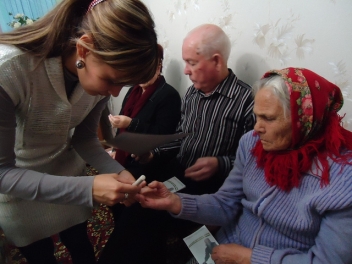 In a recent meeting of HelpAge network affiliates and partners, we discussed the issues of long-term care and care towards the end of life. From our discussions, it seemed clear that long-term care in old age is a sometimes overlooked and under-developed area of medical care and policy thinking.
In a recent meeting of HelpAge network affiliates and partners, we discussed the issues of long-term care and care towards the end of life. From our discussions, it seemed clear that long-term care in old age is a sometimes overlooked and under-developed area of medical care and policy thinking.
The end of life is just as significant as any other chapter of life and the journey towards it needs to be supported by adequate long-term care.
Long-term care is essential in dealing with many common health conditions, such as strokes, Alzheimer’s disease, Parkinson’s disease, osteoarthritis, injuries including falls and fractures, and diseases of the vital organs.
Ageing and the increasing need for long-term care
The issues of long-term care are becoming critical as the number of the “oldest old” (people over 80) is consistently on the increase. This rapid ageing is not just happening in developed countries, such as Japan, but also in less developed nations, such as India and China.
Important consequences of this are that, firstly, the ratio between “older adults” and the “older old” is changing and therefore more people are in need of long-term care.
And secondly, the “oldest old” group is predominantly women. Older women are therefore facing their final years in many cases on their own and potentially requiring more long-term care.
Critical aspects of long-term care
There are many critical aspects of long-term care, including:
- preventing debilitating diseases through early screening and intervention,
- strengthening community support services,
- fostering family relationships and bonds,
- creating and strengthening care givers’ skills and knowledge.
Financial cost of care
The comparison between long-term care provided within the communities and in institutional settings has been made often – with benefits and downfalls on both sides. The evidence, however, reveals that care provided in institutional settings is at least seven times costlier, although the levels of health and care experienced are very similar.
The financial implications of this are huge in a global economic environment with shrinking resources for health. In order to support long-term care, proper planning and policy reforms are needed.
Needs assessments within communities and a means of identifying affordable and effective ways of delivering care are crucial. Innovation and diversification of services, advancement of knowledge and technology will also have important roles to play.
Other ways forward could be to implement more self-care projects or even think of and advocate for nationalised insurance plans to covering long-term care.
The need of long-term care is only going to grow from here. It is a need that can not be overlooked.
Read more about our work on older people’s health including information on our health policy work, campaign on non communicable diseases and care.
